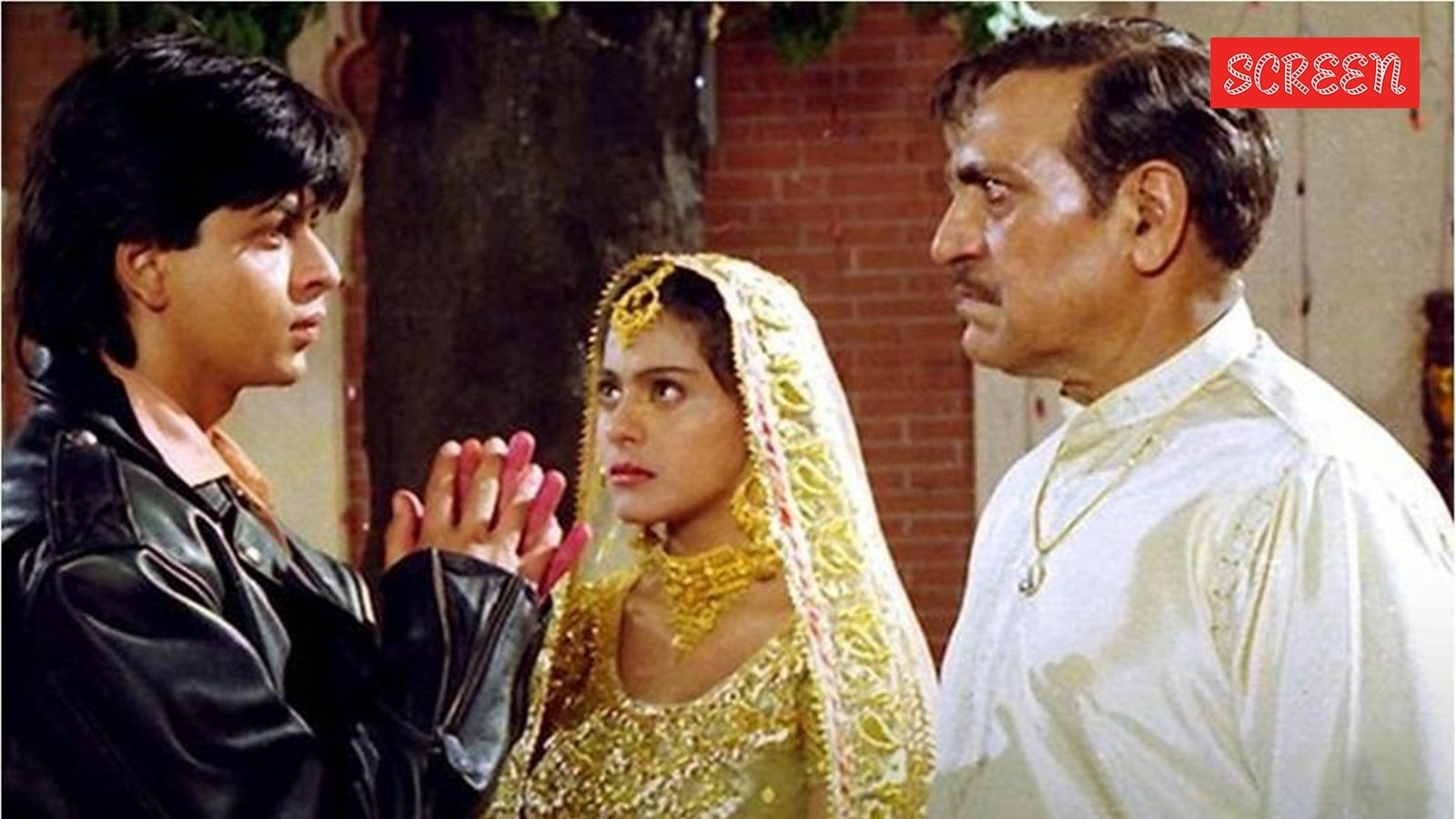Earlier this year, when Saiyaara released in theatres, it was dubbed as this generation’s Dilwale Dulhania Le Jayenge (DDLJ). It has been 30 years since that film’s release, and an entire generation has grown up and had kids since they first watched that film upon its release in 1995. DDLJ is often referred to as a defining moment for Hindi cinema, almost like Baahubali was for Telugu cinema. The Shah Rukh Khan and Kajol-starrer introduced the desi audience to what they imagined the NRI life to be, and it certainly painted a rosy picture for the aspiring migrants. The film made a star out of Shah Rukh, who, until then, was fairly successful, but in the post-DDLJ world, he was in a different league altogether. Some would argue that he continued to milk the same lover boy character for the next couple of decades, but most would agree that it worked for him perfectly well. But 30 years in, where does DDLJ stand?
DDLJ is the story of a man named Raj (Shah Rukh) and a woman named Simran (Kajol), who meet during a trip in Europe and fall in love. They are poles apart, but like any classic love story, here too, opposites attract, and without even confessing their love for each other in words, they know they are in it for the long haul. The only obstacle on their path – Simran’s dad Baldev aka Bauji (Amrish Puri) – whose ego is as fragile as the ‘Lakshmi ki murti’ in his store. He sees his daughter’s independence as a personal attack on him, just like any dictator would, and is offended when she wishes to see the world away from his watch.
 Shah Rukh Khan’s Raj decides that he will convince Amrish Puri’s Bauji to approve of his and Simran’s wedding.
Shah Rukh Khan’s Raj decides that he will convince Amrish Puri’s Bauji to approve of his and Simran’s wedding.
Bauji – The god of all things
Now, some would say that the dad should have just gotten over himself and blessed his daughter’s choices as a regular loving father, but that’s not what writer-director Aditya Chopra thought when he was making this film. In fact, it was exactly the opposite, and this was probably the secret to DDLJ’s success. He portrayed Bauji as the god of this universe, almost like a tyrant, and made the kids beg for his permission, just to live their life. Raj pledges that he won’t elope with Simran, and will convince Bauji for his aashirwad. He believes this to be the right way, and Simran just rolls along with his pledge, even though she is completely fine with eloping as well.
In an earlier chat with Bollywood Hungama, filmmaker Karan Johar, who assisted Aditya Chopra on the film, said that until DDLJ, love stories were “rebellious,” where one would “rebel against the system, the parents and stand against something, and fight or run away.” But, Karan believed that Aditya took an “interesting approach” when he “magically created” the world where Raj chose an unexpected path. In simple words, DDLJ declared that if you have to rebel for your love, then maybe it isn’t worth it. It said that the idea of love is fine only if your Bauji approves of it, and in case he doesn’t, you have to marry Kuljeet, who already has plans of cheating on you.
 Aditya Chopra gives Bauji all the power, without questioning his authority.
Aditya Chopra gives Bauji all the power, without questioning his authority.
Fall in love, but don’t rebel
By getting a Bauji-type power with lines like ‘Jaa Simran, jee le apni zindagi’, Aditya made the authority figures in families believe that having control over their child’s life was well within their right. He didn’t question the orthodoxy, he embraced it, and made you believe that nothing would work out unless the buzurgs blessed it. The buzurgs loved this move, and the younger audience, who was mesmerised by Shah Rukh’s charm, accepted it without asking any questions. This act of not asking questions would later turn out to be extremely harmful for the same youth, but they started micro-dosing on it from a young age.
Story continues below this ad
DDLJ places ‘respect for authority figures’ at the top, even above one’s own will, and in trying to solidify that message, it equates respect with dictatorial authority. The kind where grown adults can’t have a disagreement with those who have more power than them. Their thoughts and opinions are seen as a sign of rebellion, and it’s crushed as soon as it starts developing its wings. Like in an early scene of DDLJ, Bauji’s terror can be seen in the scene when he comes back from work and rings the doorbell after having a bad day at work. The daughters and the mom, who are dancing and having a fun time, immediately switch the music and change the mood of the room. The terror of his arrival has them walking on eggshells, so much so that they can’t even speak at will inside their house. DDLJ shows this as respect, and like most desi kids, it never questions this idea of respect.
 Kajol and Amrish Puri in the scene where her character seeks his permission to go on a trip.
Kajol and Amrish Puri in the scene where her character seeks his permission to go on a trip.
This is followed by another heartbreaking scene where Simran, a woman in her early 20s, is pleading in front of her father to ‘allow’ her to go on a trip. “Kya aap meri khushi ke liye meri zindagi se mujhe ek maheena bhi nahi de sakte?” she asks as she promises that in exchange for this one month, she will uproot her life and marry whosoever he says. This particular scene could have highlighted Simran’s helplessness, but that’s not what Aditya wants us to see. He wants the audience to see Bauji as the man who might be bossy, but has his heart in the right place. When he says ‘Jaa Simran, jee le apni zindagi’, which has now become an iconic line from the film and is often quoted in pop culture, you realise that Simran is nothing without her Bauji’s permission, and such is her conditioning that she has never even questioned it.
Pleasing the masses who don’t ask any questions
Bauji continues to be the villain of Simran’s life, even after she abides by his rules and uproots her life. After they move to Punjab, and Simran is set to be engaged to Kuljeet, Bauji casually throws around a threat as he wonders if Simran has gotten over the man she loves. “Agar yaad rakhegi toh boht pachtayegi,” he says. Later, when Raj actually shows up in Punjab, Simran is confident that Bauji could kill Raj, and her fear can be seen in her eyes, yet, she does nothing about it. Because for Aditya, at this point, Simran is just a spectator in her own life who will just roll along with whatever decision is taken for her.
DDLJ had a cultural moment in the 1990s, and the impact of that moment can be felt even till this day, and why not? A desi film that upholds the so-called desi values, with dominating villainous parents being presented as well-meaning gentle giants, and women who have no say in their life, DDLJ made sure that it pleased the masses. 30 years later, the masses still aren’t asking any questions from authority figures, Aditya was just an early adopter of this plan.



